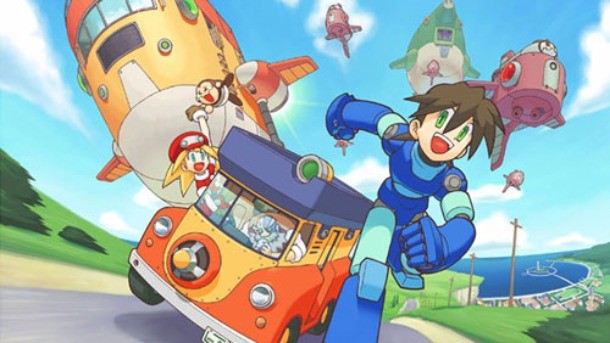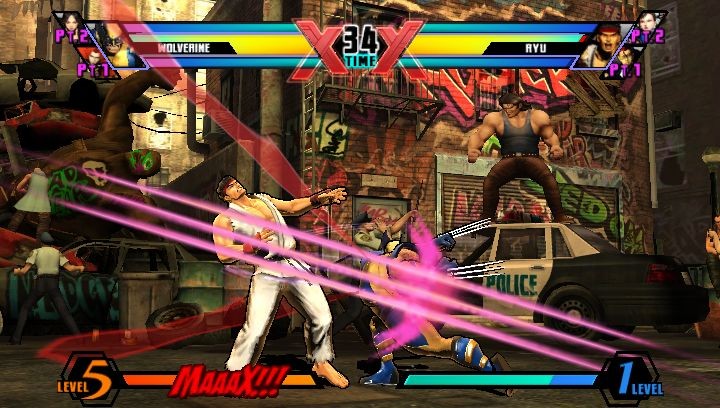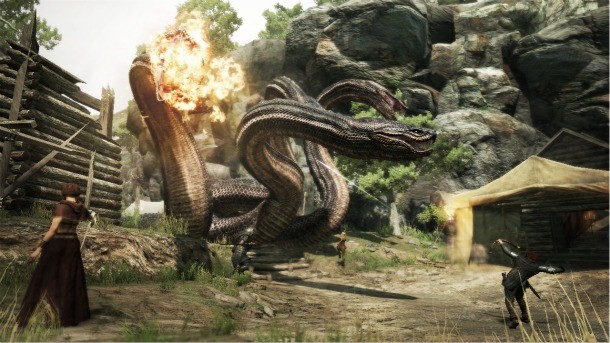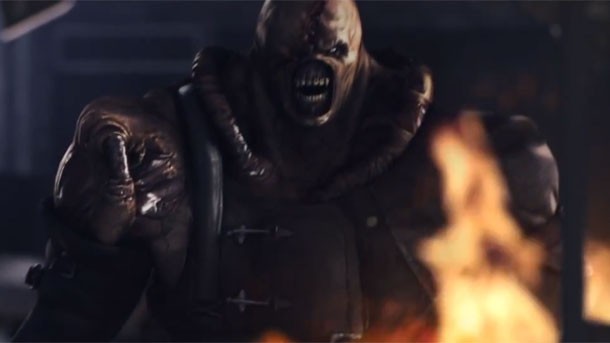Former Capcom Producer Ben Judd Talks Capcom, Bridging West/East Development

For our article "What's Happening at Capcom" in issue 225 of Game Informer, we spoke with former Capcom producer Ben Judd. The man responsible for Bionic Commando: Rearmed and the 2009 Bionic Commando reboot has a lot to say about the goings on at Capcom, including Mega Man creator Keiji Inafune's departure, the cancelled Mega Man games, and the state of Japanese game development. Now helping bridge Western and Japanese game development at agency Digital Development Management, Judd's perspective on Capcom is more valuable than ever.
On Capcom acquiring Blue Castle
"A lot of these initiatives are representative of the old Capcom. Now that Inafune-san is gone from the company, I can’t say what the new Capcom is going to be. Whether it’s going to continue… It’s made so much progress in learning how to work with the West, and no one can deny the fact that Western gaming continues to evolve and get better and better. I think that they don’t give themselves enough credit as a company because when I talk to other Japanese publishers they see Capcom working with the West as a huge success. They sort of are kind of envious of that, they’re like, 'How are you able to do that?' Of course a lot of that goes on to Inafune-san and his willingness to be open-minded and knowing that the Japanese industry by and of itself is not going to be able to make the games the rest of the world wants. We need to seek help and try to collaborate with other genius creators in other countries. Both of those really helped, but he’s left the company.
'I can’t really say what the new Capcom is going to symbolize. It’s great that they went out and purchased Blue Castle and made them part of Capcom, but there are a lot of times when a company purchases a great developer and in the end they don’t make the transition work. Now that you’re bridging cultural boundaries, no one can say whether that collaboration is going to work or not. If it were me, if it were my company, I would do whatever I could to get five or 10 of my best designers or creators from Capcom and send them to go live at Capcom Vancouver. I’d say this is an additional 10 people you have on your team and there’s language barriers or whatever, but ultimately you’re going to learn from them and they’re going to learn from you. I don’t think one person is going to do it. I think you need to invest and have five or 10 people, a decent core size of some of your best creators, over there. Only then can you reach that perfect hybrid. Because if it’s just, 'We bought them. They made a great game once. Let's leave them to their own devices,” I don’t really think that’s going to really be enough to reach that full Capcom flavor you need to."
On Inafune’s departure
"Without coming out and saying it, I’m just going to leave it up to your readers. If it were me, it would seem very strange that one of Capcom’s most successful characters – probably their key mascot – totally disappeared for over a year when there are over a hundred Mega Man games. It seems like a very strange coincidence to me, especially when you’re talking about a 3DS title and future games that feature him. I can’t comment on why that’s happened, but if I were a Mega Man fan that would seem very strange to me. It’s like Nintendo having two Mario games in development, canceling them both, and then not creating any Mario for a year or two. Not because they’re just working on the quality and waiting to reveal a great Mario game, but just because they’re not making them anymore.
"In the end, for whatever reason, [Capcom] may or may not be doing these games. It’s a shame because, like myself – I played Mega Man 2, it’s one of my fondest gaming memories – to not have any more Mega Man for whatever reason seems like a big disappointment. The game industry has shifted to a point where there are less and less packaged titles and more digital titles and now a lot of the money is going to digital. A lot of 2D, side-scrolling platforming games are digital. An iPad Mega Man, a PS Vita Mega Man game, all of these seem very interesting to me and the fact that I’m not seeing them – again, Capcom’s mascot character – is disappointing as a Mega Man fan."

On the cancellations of Mega Man Legends 3
"There are two perspectives you can take. One is the Infinity Ward perspective, and that is as gamers we have passionate love towards these games and we like to believe when a hero or someone in the game industry who is 'fighting the man,' so to speak, when he does something against the publisher that ultimately it’s for the better of the game. That he’d be rewarded. But in reality when it comes to Infinity Ward, when it comes to the guys that made that what it is today, they moved on and yet Call of Duty still sells like mad. One way of thinking about it is, 'Yeah, the fans are disappointed and that’s really sucky and Capcom is not connected with their hardcore base anymore.' But then fast forward a few years, if they did release a Mega Man game, then all those people who were crying sour grapes will still buy it. Even it doesn’t have any of the original team attached or the creator. Even if Inafune-san is not on it, they like the games that they like and as much as a gamer you’d want to support the creator, I just think the reality is most people wouldn’t. They’d just buy it because they want to play Mega Man. That’s one way of looking at it.
"The other way is I think a lot of these initiatives were created through Inafune-san, and it’s a new Capcom right now. All of the key creators I knew when I joined the company – [Noritaka] Funamizu, [Keiji] Inafune, [Hideki] Kamiya, [Shinji] Mikami – all these people are now gone. So the creators of Monster Hunter, Resident Evil, Devil May Cry, Mega Man, all the biggest franchises that continue to be hits they commoditize. Their key creators are now all gone. Inafune-san was the last one to leave. Now it’s very interesting to see if Capcom is able to create original IPs that are going to be the mega hits that the Resident Evils of the heyday were. Or whether they’re going to succumb to sequelitis and say, 'We make most of our money off of Resident Evil, Monster Hunter in Japan, now it’s the fighting games, and until that trend tapers off we’ll just focus on that.' Capcom has a history of doing that. They will have this genius idea, a great game will come out, and then they’ll just go into sequel mode. Then they’ll disappear, then they’ll have another mega hit. They very well could do that.
On the significance of Dragon’s Dogma and Asura’s Wrath’s success
"It will be very interesting to see how Dragon’s Dogma does as a game. I know it has their uber-producer, [Hiroyuki] Kobiyashi-san, who did Resident Evil 4 and Devil May Cry 4. He was the producer on Devil Kings, Sengoku Basara series, which does very well in Japan. This guy knows how to make a game a hit. He’s attached to Dragon’s Dogma and has some of the company’s most creative talent working on it. Seeing how that works out as an original title, whether it becomes the next big thing or doesn’t, could ultimately determine how aggressive Capcom wants to be with original titles versus sequels. It will be an interesting thing to watch. To fast forward a year after that game has been released and for us to have this conversation again and see how Capcom has or hasn’t changed.
Whether it’s a Resident Evil, Devil May Cry, or a Mega Man, every time they have done something innovative - almost sometimes given birth to a new genre whether it’s survival horror, action horror, hardcore stylish action – they’ve always done that. You have to look at both Asura’s Wrath and Dragon’s Dogma and ask, 'Are these two titles borrowing off of other games or just a new iteration in the same genre? Or are they doing something so innovative that it could be called a new sub-genre in and of itself?' I don’t know if I’d go that far with either of them. I think it’s going to be an uphill battle. At least Capcom does have the hardcore fans. At least they’re putting higher quality people on the project. I’d like to hope that it works out for them, but I think it’s going to come down to how innovative they are. That’s what it always seems to be. When Capcom really comes out with something innovative, then they really nail it. If they don’t, then it usually ends up being a middling experience.
On franchise fatigue
"The only thing that is going to change [Capcom’s constant sequels] is going to be that the cycle gets so long (i.e. they continue to milk their franchises too rapidly. Like if it’s a Resident Evil and they have too many offshoot games in too short of a span, the quality continues to decrease, and people start to lose interest to the point that they’re not monetizing enough for it to make a profit). Or in the second scenario, which I think is more likely to happen, is that the way that games are sold is going to change to the point where Capcom has to rethink how they develop their games. Free-to-play and DLC are not only just valid business models, they’re going to be the future whether package gamers like it or not. Whether you’re going to spend $50 on a game that includes four hours of content that you didn’t really want anyways, or spend $30 that was basically $10 [of] content you want, then ultimately that business model is going to win out.
"A good example is a fighting game. I love Blanka. I love E.Honda. There are certain characters I love. There are other characters I could give less of a crap about. If I was able to buy a fighting game with only the characters I knew I wanted to play, and I was able to do it for half the price that I normally would, that would seem very interesting to me. I could still play against other players that bought the characters that they wanted, but me, personally, to know that I’m never going to play Able or Cammy, then having them in the game is not interesting to me. If Capcom is able to eventually change their business model to start to step into more free-to-play or microtransactions and able to take these reiterations and build it so that players that want to buy all that additional content can, and Capcom can maximize their money while not penalizing the players then they’re going to have much happier gamers. I think they’re going to have the perfect blend of reiteration, they’ve created new content without making the same game over and over again. I think that’s going to help them appeal more and more to their hardcore."

One whether he’d be worried right now if he were still with Capcom
"Yes, I would. That’s because the key creative staff that created their best franchises are no longer there. If we’re seeing new franchises that are being created through the second-stringers who have come up behind the major creators that created all these great franchises, then that’d be alright. But I haven’t seen any of that. That would be a concern. Capcom needs to be a company that focuses on development. It needs to have high level, powerful, creative developers in the highest ranks. If you look at the company right now - and this is information anybody can find – go look at the board of directors. How many of those people are genius creators that have been in the industry for 20-plus years and know what it takes?
"Go look through, track down their pedigrees and see. If there aren’t any genius creators and there aren’t any people who have climbed their way up and really created something, then that may show the direction the company is going in. You’ve got to have a balance between creativity and business people, and if there’s too much business, then a lot of time creativity fails out. And if there’s too much creativity then sometimes you end up with a game that you can’t release for five years, but it’s a great game. The balance is important. I would look into that and ask if these are the people that are going to lead Capcom to the next step? I hope so. I love the company and I always will. They’ve got some of the best IP, even today. But management is important. They determine where the company will go. They determine whether there are five new Mega Man games or zero new Mega Man games."
On his new job bridging Western and Japanese game development at Digital Development Management
"Why this is so necessary for Japan is because just like America or Europe, you have hundreds of these smaller developers, and the only way that they’ve been able to survive in the past has been reliance on large Japanese publishers. Unfortunately, the Japanese gaming market is shrinking day in and day out. So you’re in a very dangerous place where you’ve got the traditional Japanese way of doing business -- which is once you make a contact you’ve always got that contact and you can always rely on them for steady work. They’re finding that they can no longer do that. Unless you start expanding the options that you’ve got and are able to start looking to western publishers or European publishers for possible funding, then they’re going to be in deeper trouble.
"Initially we set up this Japanese office in January because we’ve got a lot of projects out of Japanese publishers that are basically Western developers that are clients. We’ve tied them into Japanese publishers. Probably about five or so of the biggest franchises – Devil May Cry, Resident Evil, Silent Hill, House of the Dead, and Ridge Racer. That thing I remember is when I did Bionic Commando that people would scream blue murder about is you have your purists who think it’s a Japanese franchise and only a Japanese developer can possibly do it justice. I totally understand that way of thinking because I traditionally like Japanese games. I really do. I like their aesthetic, I like their game design – their more Mario/Zelda-esque gamey game design – but, unfortunately, that reality of those Japanese games that I loved, that was probably about five years ago, and the gaming industry has moved on.
"If it’s a Japanese publisher that is smart about game design, the way that they’re setting up these internal projects is that they’re getting a core team – because traditionally the core game features are decided by a group of five to 10 people – the remaining 90 percent or so of the development team, they’re the grunts that are building out the game. Building out the models, building out the backgrounds, doing the enemy placement, etc. But the actual key features, those are decided by a core group of five to 10 people. What these Japanese companies are doing that’s smart is they’ll create a crack team of about five to 10 people and they’ll send this development team over to the Western developer and then they’ll share ideas back and forth and have a solid consensus. It was a learning process to realize that it really takes a nice blend.
"You can’t just sit there and give money to a Western developer and say, 'Have at it. Develop the best game you can. You guys know the West better than we do.' Unfortunately, they’re not that publisher. They have not necessarily worked with that IP. They don’t know, for example in Capcom’s case, what makes a great Capcom game. So that wasn’t working. Then, on the other end of the spectrum, it’s the publisher’s IP and you don’t want to sit there and assert all the publisher’s ideas on the developer because then you just need a team of robots and to just go to some third world nation and say, 'Okay, here’s the spec. Build it exactly like this. We don’t want any of your creative input.' That wouldn’t work either.
"Finding this perfect blend is something I knew it would take Capcom awhile to get to, but they’ve finally reached it. I think with the Bionic Commando game - not Rearmed, but the packaged product – that was one where we hadn’t fully grasped the right mix. I think we finally really hit on it with Dead Rising 2. They sent the team over [to Blue Castle Games, now Capcom Vancouver] and it worked out great. Once you have that really collaborative spirit, with creators talking to creators, that’s when you can develop the best East/West titles. To the purists, I would say no matter how much you like Japanese games, there are areas where certain Japanese developers excel and there are areas they are not great in, like any developer throughout the world.
"Unfortunately, they’re programming is not the best. Their pipeline is not the best. Their netcode is not the best. But their art is top notch. Their design is also very good. If they can supplement the areas where they’re weak with Western developers, then you can really get a kick-ass project. That’s why I decided to move over to the agency job is because what it allows me to do is work with every publisher and every developer so I wasn’t just limited to Capcom products and Capcom IP. Now I can move outside of that work with Square Enix, Bandai Namco, Konami, or SNK. There are a lot of different ways I can take it."

Get the Game Informer Print Edition!
Explore your favorite games in premium print format, delivered to your door.
- 10 issues per year
- Only $4.80 per issue
- Full digital magazine archive access
- Since 1991









